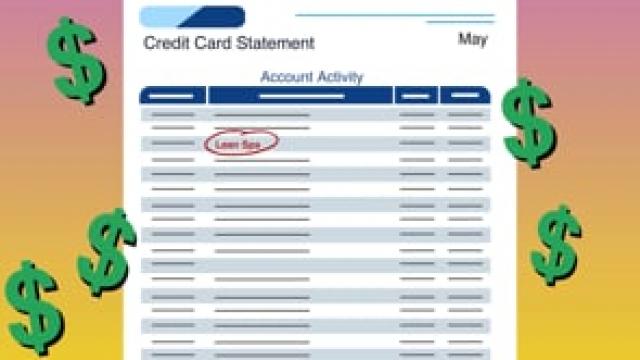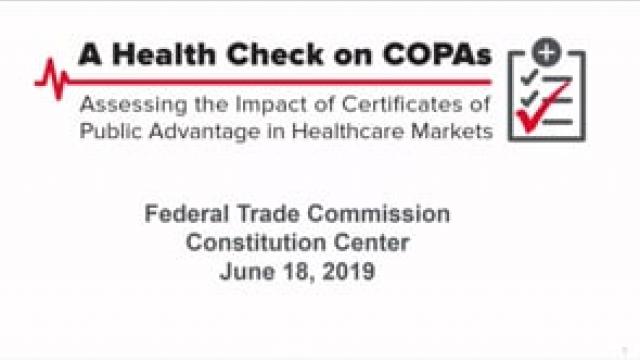Competition in health care markets benefits consumers because it helps contain costs, improve quality, and encourage innovation. The Federal Trade Commission's job as a law enforcer is to stop firms from engaging in anticompetitive conduct that harms consumers. The agency also provides guidance to market participants -- including physicians and other health professionals, hospitals and other institutional providers, pharmaceutical companies and other sellers of health care products, and insurers -- to help them comply with the nation's antitrust laws.
Additionally, the Commission and its staff undertake a variety of other activities to promote competition in health care. One key area is research and reports on competition issues in health care and, in the past, has included such matters as: empirical studies of generic drug entry, contact lens sales, and mail order pharmacies; economic analyses of the effects of mergers involving non-profit hospitals and of state "any willing provider" laws; and a series of public hearings in 2003 on a wide range of issues in health care.
Another broad area of activity is competition advocacy. Aside from speeches to market participants, the FTC and its staff advise federal and state governmental bodies on competition issues in health care, in an effort to provide policymakers with a sound basis for assessing the implications for competition and consumers of proposed legislative or regulatory actions.
This web site provides information about the full range of FTC activities to protect and promote competition in health care markets.
Core Health Care Competition Documents
- Statements of Antitrust Enforcement Policy in Health Care [PDF]
- Statement of Antitrust Enforcement Policy Regarding Accountable Care Organizations
- Pharmaceutical Agreement Filing Requirements [PDF]
- Frequently Asked Questions About Filing Pharmaceutical Agreements [PDF]
- Overview of FTC Actions in Health Care Services and Products [PDF]
- Overview of FTC Actions in Pharmaceutical Products and Distribution [PDF]
- Topic and Yearly Indices of Health Care Antitrust Advisory Opinions by Commission and Staff [PDF]
Health Care Initiatives
- Improving Health Care: A Dose of Competition (2003 Hearings and July 2004 Report)
- Accountable Care Organizations
- Pharmaceutical Agreement Filings
- Advisory Opinion Process (Health Care) [PDF]
Contact information for Bureau of Competition staff on health care matters
- Cerebral, Inc. and Kyle Robertson, U.S. v. ( )
- Benefytt Technologies, et al., FTC v. ( )
- SuperGoodDeals.com, Inc. ( )
- Novant Health, Inc. and Community Health Systems, Inc., In the Matter of ( )
- Illumina, Inc., and GRAIL, Inc., In the Matter of ( )
- IQVIA Holdings/Propel Media, In the Matter of ( )
- Vyera Pharmaceuticals, LLC ( )
- John Muir Health/Tenet Healthcare Co., In the Matter of ( )
- Sanofi/Maze Therapeutics, Inc., In the Matter of ( )
- Amgen, Inc. and Horizon Therapeutics plc, In the Matter of ( )
- American Screening, LLC ( )
- Surescripts LLC ( )
- Easy Healthcare Corporation, U.S. v. ( )
- Amgen Inc. and Horizon Therapeutics plc, FTC v. ( )
- The Bountiful Company ( )
- Dalal A. Akoury d/b/a AWAREmed, et al., U.S. v. ( )
- LCA-Vision Inc. d/b/a LasikPlus ( )
- GoodRx Holdings, Inc. ( )
- ZyCal Bioceuticals Healthcare Company, Inc. ( )
- San Juan IPA, Inc. ( )
- Federal Agencies Launch Portal for Public Reporting of Anticompetitive Practices in the Health Care Sector ( )
- Alcohol Addiction Treatment Firm will be Banned from Disclosing Health Data for Advertising to Settle FTC Charges that It Shared Data Without Consent ( )
- FTC, HHS Extend Public Comment Period on Generic Drug Shortages and Competition Request for Information ( )
- FTC Sends More Than $527,000 in Refunds to Bountiful Consumers Deceived By “Review Hijacking” on Amazon.com ( )
- Federal Trade Commission, the Department of Justice and the Department of Health and Human Services Launch Cross-Government Inquiry on Impact of Corporate Greed in Health Care ( )
- FTC Hosts March 5 Virtual Workshop on Private Equity in Health Care ( )
- FTC Releases Agenda for Virtual Workshop on Private Equity in Health Care ( )
- FTC Action Leads to Ban for Company and Its Owner Who Failed to Ship PPE ‘Next Day’ at Height of Pandemic ( )
- FTC Sends Almost 160,000 Claim Forms to Consumers Who Could Receive Money Under a Settlement with LasikPlus Providers Over Deceptive Price Advertising ( )
- FTC, HHS Seek Public Comment on Generic Drug Shortages and Competition Amongst Powerful Middlemen ( )
- FTC to Host Virtual Workshop on Private Equity in Health Care ( )
- FTC Obtains $195 Million Judgment, Permanent Ban on Telemarketing and Selling Healthcare Products Against Simple Health Over Charges It Sold Sham Health Insurance ( )
- FTC Submits Comment on March-In Rights to Promote Efforts to Lower Drug Prices ( )
- FTC Sues to Block Novant Health’s Acquisition of Two Hospitals from Community Health Systems ( )
- Statement on Second Circuit Order Upholding “Pharma Bro” Martin Shkreli’s Lifetime Ban ( )
- Statement Regarding Illumina’s Decision to Divest Grail ( )
- Statement Regarding the Termination of John Muir’s Takeover of San Ramon Regional Medical Center from Tenet Healthcare ( )
- FTC Approves Final Order Settling Horizon Therapeutics Acquisition Challenge ( )
- Statement Regarding the Termination of Sanofi’s Proposed Acquisition of Maze Therapeutics’ Pompe Disease Drug ( )
- FTC Seeks to Block Sanofi’s Acquisition of Rare Disease Drug that Threatens Sanofi’s Monopoly ( )
- Small business people are among those getting $100 million back due to FTC action challenging Benefytt Technologies’ sham health plans( )
- A required action after refraction: FTC staff sends cease and desist letters about Eyeglass Rule compliance( )
- Framing the issues at a May 18th event about proposed Eyeglass Rule changes( )
- I’ll pay you to give this blog post five stars( )
- Abracadabra: Bad reviews be gone ( )
- Physician Group and Healthcare Facility Merger Study( )
- A prescription for complying with the Eyeglass Rule( )
- MMA Reports: No tricks or treats—just facts( )
- FTC updates the Contact Lens Rule: What it means for prescribers and sellers( )
- Then, now, and down the road: Trends in pharmaceutical patent settlements after FTC v. Actavis( )
- Control no longer controlling for HSR reporting of not-for-profit combinations( )
- Insights into contact lenses: FTC workshop will focus on the Contact Lens Rule( )
- Quo Vadis Post-Actavis?( )
- Antitrust Violation vs. Injury-in-Fact: A distinction that makes a difference( )
- Is FTC v. Actavis Causing Pharma Companies to Change Their Behavior?( )
- Monitors: Expert eyes and ears in Commission orders( )
- From the antitrust mailbag: What can the FTC do about prescription drug price spikes?( )
- Power shopping for an alternative buyer( )
- Private Capital, Public Impact: An FTC Workshop on Private Equity in Health CareMarch 5, 2024
- Prehearing scheduling conference in the matter of Novant Health, Inc. & Community Health Systems, Inc. - February 20, 2024February 20, 2024
- Open Commission Meeting - July 20, 2023July 20, 2023
- Open Commission Meeting - February 17, 2022February 17, 2022
- PrivacyCon 2021July 27, 2021
- PrivacyCon 2020July 21, 2020
- FDA / FTC Workshop on a Competitive Marketplace for BiosimilarsMarch 9, 2020
- A Health Check on COPAs: Assessing the Impact of Certificates of Public Advantage in Healthcare MarketsJune 18, 2019
- Understanding Competition in Prescription Drug Markets: Entry and Supply Chain DynamicsNovember 8, 2017
- Now Hear This: Competition, Innovation, and Consumer Protection Issues in Hearing Health CareApril 18, 2017
- Examining Health Care CompetitionFebruary 24, 2015
- Conditional Pricing Practices: Economic Analysis and Legal Policy ImplicationsJune 23, 2014
- Examining Health Care CompetitionMarch 20, 2014
- Follow-On Biologics Workshop: Impact of Recent Legislative and Regulatory Naming Proposals on CompetitionFebruary 4, 2014
- Consumer Protection and the Healthcare MarketplaceSeptember 19, 2013
- Senior Identity Theft: A Problem in This Day and AgeMay 7, 2013
- Pet Medications Workshop October 2, 2012
- Another Dose of Competition: Accountable Care Organizations and AntitrustMay 9, 2011
- Workshop Regarding Accountable Care Organizations and Implications Regarding Antitrust, Physican Self-Referral, Anti-Kickback and Civil Monetary Penalty (CMP) LawsOctober 5, 2010
- Emerging Health Care Competition and Consumer Issues: Competition Issues Involving Follow-on Biologic DrugsNovember 21, 2008
- Remarks by Chair Lina M. Khan As Prepared for Delivery at White House Event on Lowering Healthcare Costs ( )
- Remarks by Chair Lina M. Khan As Prepared for Delivery at the Private Capital, Public Impact Workshop on Private Equity in Healthcare ( )
- Remarks by Chair Lina M. Khan As Prepared for Delivery for White House Roundtable on PBMs ( )
- Remarks by Chair Lina M. Khan at American Medical Association National Advocacy Conference ( )
- Comment of the United States Federal Trade Commission - Draft Interagency Guidance Framework for Considering the Exercise of March-In Rights ( )
- Statement of Chair Lina M. Khan Joined by Commissioner Rebecca Kelly Slaughter In the Matter of Sanofi/Maze Therapeutics ( )
- Federal Trade Commission Statement Concerning Brand Drug Manufacturers' Improper Listing of Patents in the Orange Book ( )
- Statement of Chair Lina M. Khan at the September Open Commission Meeting on Brand Drug Manufacturers’ Improper Listing of Patents in the Orange Book ( )
- Statement of Commissioner Rebecca Kelly Slaughter Regarding the Health Breach Notification Rule and the Biometric Policy Statement as Prepared for Delivery ( )
- Statement of Chair Lina M. Khan Regarding the Policy Statement Concerning Reliance on Prior PBM-Related Advocacy Statements and Reports ( )
- Remarks of Chair Khan at the May 2023 Open Commission Meeting ( )
- Statement of Commissioner Rebecca Kelly Slaughter regarding the Health Breach Notification Rule and the Biometric Policy Statement ( )
- Statement of Commissioner Alvaro M. Bedoya Joined by Commissioner Rebecca Kelly Slaughter Regarding Amazon.com, Inc.'s Acquisition of 1Life Healthcare, Inc. ( )
- Remarks of Chair Lina M. Khan at the American Economic Liberties Project and the National Community Pharmacists Association Event Titled How Pharmacy Benefit Managers Impact Drug Prices, Communities, and Patients ( )
- Oral Remarks of Christine S. Wilson at Open Commission Meeting on June 16, 2022 ( )
- Statement of Commissioner Rebecca Kelly Slaughter Regarding the Policy Statement of the Federal Trade Commission on Rebates and Fees in Exchange for Excluding Lower-Cost Drug Products ( )
- Statement of Commissioner Christine S. Wilson Regarding the FTC Policy Statement on Rebates and Fees in Exchange for Excluding Lower Cost Drug Products ( )
- Statement of Commissioner Alvaro M. Bedoya Regarding the Commission's Policy Statement on Rebates and Fees in Exchange for Excluding Lower-Cost Drug Products ( )
- Remarks of Chair Lina M. Khan Regarding Policy Statement on Rebates and Fees in Exchange for Excluding Lower-Cost Drug Products ( )
- Policy Statement of the Federal Trade Commission on Rebates and Fees in Exchange for Excluding Lower Cost Drug Products ( )
- Staff Opinion Letter Concerning Discounted Pharmaceuticals and Medical Devices Under the Non-Profit Institutions Act ( )
- Letter From Markus H. Meier, Assistant Director, Bureau of Competition, Concerning Crouse Health Hospital's Proposal To Sell Discounted Pharmaceutical Products to the Employees, Retirees, and Their Dependents of Its Affiliate, Dated October 20, 2017 ( )
- Quest Analytics Group ( )
- Norman Physician Hospital Organization ( )
- The Methodist Hospital System ( )
- Generic Pharmaceutical Association ( )
- Rx-360 International Pharmaceutical Supply Chain Consortium ( )
- Yakima Valley Memorial Hospital ( )
- Community CarePartners, Inc. ( )
- University of Michigan ( )
- TriState Health Partners, Inc. ( )
- Kaiser Foundation Health Plan ( )
- Greater Rochester Independent Practice Association, Inc. ( )
- MedSouth, Inc. ( )
- St. John's Health System ( )
- Alpena Public Schools ( )
- Suburban Health Organization ( )
- North Mississippi Health Services ( )
- Stevens Hospital, of Edmonds, Washington ( )
- Bristol-Myers Squibb Company ( )
- Summary Report on the FDA/FTC Workshop on a Competitive Marketplace for Biosimilars ( )
- Federal Trade Commission Report on Pharmaceutical Product Hopping ( )
- Order to File Special Report Regarding Physician Group and Healthcare Facility Mergers ( )
- Order to File Special Report to Collect Information Regarding Certificates of Public Advantage (COPA) ( )
- Prices for Medical Services Vary Within Hospitals, But Vary More Across Them ( )
- Simulating Hospital Merger Simulations ( )
- The effects of physician and hospital integration on Medicare beneficiaries’ health outcomes ( )
- Why is Distance Important for Hospital Choice? Separating Home Bias from Transport Costs ( )
- Price Effects of a Merger: Evidence from a Physicians’ Market ( )
- Federal Trade Commission Staff Report on the Homeopathic Medicine & Advertising Workshop ( )
- Direct-to-Consumer Advertising and Online Search ( )
- Competition in the Pet Medications Industry: Prescription Portability and Distribution Practices ( )
- Agreements Filled With the Federal Trade Commission Under the Medicare Prescription Drug, Improvement, and Modernization Act of 2003: Overview of Agreements Filed In Fiscal Year 2013: A Report By the Bureau of Competition ( )
- Banning Foreign Pharmacies from Sponsored Search: The Online Consumer Response ( )
- Self-Regulation in the Alcohol Industry: Report of the Federal Trade Commission ( )
- Policy Perspectives: Competition and the Regulation of Advanced Practice Nurses ( )
- Economics at the FTC: Physician Acquisitions, Standard Essential Patents, and Accuracy of Credit Reporting ( )
- Agreements Filed With the Federal Trade Commission Under the Medicare Prescription Drug, Improvement, and Modernization Act of 2003: Overview of Agreements Filed in Fiscal Year 2012: A Report by the Bureau of Competition ( )
- Agreements Filed With the Federal Trade Commission Under the Medicare Prescription Drug, Improvement, and Modernization Act of 2003: Overview of Agreements Filed in Fiscal Year 2011: A Report by the Bureau of Competition ( )
- Agreements Filed With the Federal Trade Commission Under the Medicare Prescription Drug, Improvement, and Modernization Act of 2003: Overview of Agreements Filed in Fiscal Year 2010: A Report by the Bureau of Competition ( )
- FTC Staff Comment to Department of Labor on Proposed Amendments to Regulations Implementing the Mental Health Parity and Addiction Equity Act ( )
- FTC Staff Comment Concerning North Carolina Senate Bill 743 ( )
- FTC Staff Submission to NYS Health Department Regarding the COPA Application of SUNY Upstate Medical University and Crouse Health System ( )
- FTC Staff Comment to Department of Veterans Affairs Concerning Authority of VA Professionals to Practice Healthcare ( )
- FTC Staff Comment to Texas Health and Human Services Commission Regarding Certificate of Public Advantage Applications ( )
- FTC Staff Comment to Attorney General of Texas Concerning Certified Registered Nurse Anesthetists (CRNA) Regulations ( )
- FTC Staff Letter to the Centers for Medicare and Medicaid Services Regarding the Interim Final Rule with Policy and Regulatory Revisions in Response to the COVID-19 Public Health Emergency ( )
- FTC Staff Letter to Department of Health and Human Services Concerning the 21st Century Cures Act: Interoperability, Information Blocking and the ONC Health IT Certification Program Rule ( )
- FTC Staff Comment to the Ohio House of Representatives Concerning Ohio House Bill 177 ( )
- FTC Staff Comment to the Kansas House of Representatives Concerning Kansas House Bill 2412 ( )
- FTC Staff Comment to the North Carolina State Board of Dental Examiners Regarding Proposed Rule Changes to 21 N.C. Admin. Code 16W ( )
- Comment of the Staff of the Federal Trade Commission to Massachusetts Rep. Paul J. Donato regarding HB1869 and SB1329 ( )
- FTC Staff Comment Before the Department of Health and Human Services Regarding the 21st Century Cures Act: Interoperability, Information Blocking, and the ONC Health IT Certification Program ( )
- FTC Staff Comment to the FDA Department of Health and Human Services on Its Updated Guidance for Industry on the “Nonproprietary Naming of Biological Products” ( )
- Statement of the Federal Trade Commission to the Alaska Senate Committee on Health & Social Services on Certificate of Need Laws and SB 1 ( )
- Federal Trade Commission Comment On the Food and Drug Administration’s Revised Draft Guidance For Industry, Entitled “Citizen Petitions and Petitions For Stay of Action Subject To Section 505(q) of the Federal Food, Drug, and Cosmetic Act.” ( )
- FTC Staff Comment on New York's proposal to allow licensure by endorsement of Canadian dental licenses ( )
- FTC Staff Comment to Washington State Rep. Paul Graves, regarding S.S.B. 5411/H.B. 1473 ( )
- Federal Trade Commission Staff Comment Before the Pennsylvania State House of Representatives Regarding the Likely Competitive Impact of House Bill 100 On Advanced Practice Registered Nurse-Certified Nurse Practitioners ( )
- FTC Staff Comment Before the Georgia Department of Community Health Regarding the Certificate of Need Application Filed by Lee County Medical Center ( )
- Mylan Pharmaceuticals, et al. v. Sanofi-Aventis, et al. ( )
- Sage Chemical, Inc. et al. v. Supernus Pharmaceuticals, Inc. et al. ( )
- Jazz Pharmaceuticals, Inc. v. Avadel CNS Pharmaceuticals, LLC ( )
- SmileDirectClub, LLC v. Battle, et al. ( )
- D. Blaine Leeds and SmileDirectClub, LLC v. Jackson, et al. ( )
- Takeda Pharmaceutical Company Limited, et al. v. Zydus Pharmaceuticals (USA) Inc., et al. ( )
- Amphastar Pharmaceuticals, Inc., et al. v. Momenta Pharmaceuticals, Inc., et al. ( )
- Mylan Pharmaceuticals Inc. v. Warner Chilcott PLC ( )
- Teladoc, Incorporated, et al. v. Texas Medical Board et al. ( )
- In re Wellbutrin Antitrust Litigation ( )
- Mylan Pharmaceuticals, Inc. v. Warner Chilcott plc, et al. ( )
- Wellbutrin XL Antitrust Litigation, In re ( )
- In re K-Dur Antitrust Litigation ( )
- Arkansas Carpenters Health and Welfare Fund, et. al v. Bayer AG, et. al (In re Ciprofloxacin Hydrochloride Antitrust Litigation) ( )
- In re Ciprofloxacin Hydrochloride Antitrust Litigation ( )
- In re DDAVP Direct Purchaser Antitrust Litigation ( )
- In re Tamoxifen Citrate Antitrust Litigation ( )
- Teva Pharmaceuticals USA, Inc. v. Pfizer, Inc. ( )
- Andrx Pharmaceuticals, Inc. v. Kroger Co ( )
- Jackson, Tennessee Hospital Co. v. West Tennessee Healthcare, Inc ( )
- Stopping COVID-19 Fraud and Price Gouging ( )
- Prepared Statement of the Federal Trade Commission: Curbing COVID Cons: Warning Consumers about Pandemic Frauds, Scams, and Swindles ( )
- Prepared Statement of the Federal Trade Commission On “Oversight of the Enforcement of the Antitrust Laws” ( )
- Prepared Statement of the Federal Trade Commission On "Oversight of the Enforcement of the Antitrust Laws" ( )
- Prepared Statement of the Federal Trade Commission On Pay-For-Delay Deals: Limiting Competition and Costing Consumers ( )
- Prepared Statement of the Federal Trade Commission, "Oversight of the Enforcement of the Antitrust Laws" ( )
- Prepared Statement of the Federal Trade Commission on Antitrust Enforcement in the Health Care Industry ( )
- Prepared Statement of the Federal Trade Commission: Oversight of the Federal Trade Commission Bureau of Competition and the Department of Justice Antitrust Division ( )
- Prepared Statement of the Federal Trade Commission Concerning "The Community Pharmacy Fairness Act of 2007" ( )
- Prepared Statement of the Federal Trade Commission On Protecting Consumer Access To Generic Drugs: The Benefits Of A Leglislative Solution To Anticompetitive Patent Settlements In The Pharmaceutical Industry ( )
- Prepared Statement of the Federal Trade Commission On Internet, and Intellectual Property ( )
- Prepared Statement of the Federal Trade Commission On Health Care Competition ( )
- Prepared Statement of the Federal Trade Commission On Health Care Competition ( )
- Prepared Statement of the Federal Trade Commission On Generic Drug Entry ( )
- Prepared Statement of the Federal Trade Commission On Subcommittee on Federal Financial Management, Government Information, and International Security of the Committee on Homeland Security and Governmental Affairs, United States Senate ( )
- Prepared Statement of the Federal Trade Commission On Contact Lens Legislation ( )
- Prepared Statement of the Federal Trade Commission On Greater Access to Affordable Pharmaceuticals Act ( )
- Prepared Statement of the Federal Trade Commission On Competition In the Pharmaceutical Industry ( )
- Prepared Statement of the Federal Trade Commission On Competition in the U.S. Pharmaceutical Industry ( )
- Prepared Statement of the Federal Trade Commission On Pharmaceutical Industry ( )

















